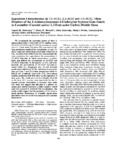Expression Characteristics of CS-ACS1, CS-ACS2 and CS-ACS3, ThreeMembers of the 1-AminocycIopropane-l-Carboxylate Synthase Gene Familyin Cucumber {Cucumis sativus L.) Fruit under Carbon Dioxide Stress

View/
Date
1999Author
Mwaniki, Mercy W.
Nakatsuka, Akira
Shiomi, Shinjiro
Mathooko, Francis M.
Metadata
Show full item recordAbstract
We investigated the expression pattern of three 1-aminocydopropane-1-carboxylate (ACC) synthase genes,CS-ACS1, CS-ACS2 and CS-ACS3 in cucumber (Cucumissativus L.) fruit under CO2 stress. CO2 stress-induced eth-ylene production paralleled the accumulation of only CS-ACS1 transcripts which disappeared upon withdrawal ofCO2. Cycloheximide inhibited the CO2 stress-induced eth-ylene production but superinduced the accumulation ofCS-ACS1 transcript. At higher concentrations, cyclohex-imide also induced the accumulation of CS-ACS2 andCS-ACS3 transcripts. In the presence of CO2 and cyclo-heximide, the accumulation of CS-ACS2 transcript oc-curred within 1 h, disappeared after 3 h and increasedgreatly upon withdrawal of CO2. Inhibitors of protein ki-nase and types 1 and 2A protein phosphatases which in-hibited and stimulated, respectively, CO2 stress-inducedethylene production had little effect on the expression ofthese genes. The results presented here identify CS-ACS1as the main ACC synthase gene responsible for the in-creased ethylene biosynthesis in cucumber fruit underCO2 stress and suggest that this gene is a primary re-sponse gene and its expression is under negative controlsince it is expressed by treatment with cycloheximide. Theresults further suggest that the regulation of CO2 stress-in-duced ethylene biosynthesis by reversible protein phos-phorylation does not result from enhanced ACC synthasetranscription.
